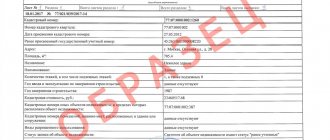Concept and content of property rights
1.
It is necessary to distinguish between property as an economic category and property rights.
Property as an economic category
characterizes relations in society between subjects regarding material goods that are necessary for the existence of any society. These are certain economic relations that are subject to legal formalization.
Ownership
is the most important property right.
Like any property right, it is absolute
, since the owner (authorized person) is precisely known, all other persons act as obligors in relation to the owner. Along with other features of a property right, property rights are characterized by such a feature as an indefinite nature.
2. In an objective sense
ownership is a set of legal norms governing relations regarding the appropriation and ownership of material goods to a certain person or persons, the exercise by the owner of the powers of ownership, use and disposal of a thing by his own will and in his own interest, regardless of other persons.
In a subjective sense
The right of ownership is the legally enforceable ability of the owner to own, use and dispose of the thing belonging to him.
The powers of possession, use and disposal belonging to the owner of a thing constitute the content
property rights (Article 209 of the Civil Code).
3.
The right of
possession
is the legally secured ability of the owner to possess a thing, to have it physically, to dominate over it.
The right of possession must be distinguished from the actual possession of a thing. The owner of a thing can transfer it into the possession of another person, for example, rent it out. Such ownership will also be legal, since it is based on a certain legal basis - title. Possession of a thing not based on a specific title should be considered illegal.
Right of use
- this is a legally secured possibility of extracting its useful properties from a thing. The owner of a thing exercises the right to use the thing, taking into account its specific consumer properties. The owner of a thing can use it for his own interests. Thus, the owner wears clothes, eats food, and lives in residential premises that belong to him. The owner can transfer the thing for use to other persons. So, in accordance with Art. 30 of the Housing Code, the owner of a residential premises has the right to transfer it for use to other persons on the basis of a rental agreement, free use or on other legal grounds.
Power of order
- this is a legally secured opportunity to determine the legal fate of a thing. The owner can exercise the power to dispose of a thing belonging to him by performing both legal and actual actions. Legally significant actions (legal acts) include the execution by the owner of transactions aimed at alienating a thing, such as, for example, purchase and sale, donation. If the owner destroys a thing, then this also means determining the fate of the thing. The destruction of a thing during its consumption terminates the legal relationship of ownership.
The right to dispose of a thing may also belong to the non-owner. So, in accordance with Art. 76 of the Housing Code, the tenant of a residential premises under a social tenancy agreement, with the consent of the landlord and family members living together with him, has the right to transfer it for temporary use under a sublease agreement. But the non-owner is never given the right to dispose of the thing in full.
4.
The current legislation, having granted the owner these powers, also establishes the limits of their exercise. The limits of property rights are the boundaries established by law for the exercise of property rights: “The limits are objective in the sense that they do not depend on the will of the owner and other persons, but are provided for by law... no legal system can do without the proclamation of general rules and the establishment of exceptions to these rules." For example, in accordance with Art. 30 of the Housing Code, the limits of the exercise of ownership of residential premises include the need to use it only for its intended purpose, the inadmissibility of mismanagement of residential premises, the need to respect the rights and legitimate interests of neighbors, the rules for the use of residential premises, the rules for maintaining the common property of the owners of premises in an apartment building. The owner of a land plot can sell it, donate it, pledge it and dispose of it in any other way insofar as the relevant lands are not excluded from circulation on the basis of the law or are not limited in circulation (Article 260 of the Civil Code). The owner of especially valuable and state-protected cultural assets must not allow mismanagement of them, which may threaten them with the loss of their purpose (Article 240 of the Civil Code). The owner of pets must not treat them in clear contradiction with the rules established by law and the norms of humane treatment accepted in society (Article 241 of the Civil Code). Violations by the owner of the established boundaries of the exercise of property rights entail negative consequences for him, including sometimes in the form of forced termination of property rights (Articles 240, 241, 293 of the Civil Code).
5.
restrictions on the right of
ownership from the limits of the exercise of . In both cases we are talking about certain boundaries of property rights, but the nature of these boundaries differs. If limits represent objective boundaries, then restrictions on property rights are subjective. They depend on the will of the subjects themselves or the judiciary. Contractual restrictions, i.e. depending on the will of the owner, occur in cases where the latter has transferred things for possession and (or) use to another entity, for example, for rent (Article 606 of the Civil Code). The owner of a residential premises, having moved a citizen into it as a member of his family, limits himself in exercising the right to use the residential premises (Article 31 of the Housing Code). Judicial restrictions are established on the basis of a relevant judicial act in the event of a dispute.
6.
The law gives the owner not only the scope of these powers, but also places on him
the burden of maintaining
the thing belonging to him and places on him
the risk of accidental death
or accidental damage to property, unless otherwise provided by law or contract (Articles 210, 211 of the Civil Code).
Under the burden of maintenance
property should be understood as the owner’s obligation to maintain it in proper, serviceable, safe and suitable for use in accordance with the purpose of the property. This burden, as an inevitable necessity associated with the possession and use of a thing, is directly tied to the right of ownership and follows it. The norm that places the burden of maintaining a thing on the owner is dispositive. Thus, as a general rule, when transferring property for rent, the lessor is obliged to carry out major repairs of the thing, and the tenant - current, unless otherwise provided by law or agreement (Article 616 of the Civil Code). Quite rarely, the discretion of the parties to an agreement regarding the content of a thing is limited by mandatory norms. In a social rental agreement for residential premises, the obligation to carry out major repairs of residential premises is always the responsibility of the landlord; the tenant must carry out its current repairs (Articles 65, 67 of the Housing Code). In a rental agreement, the responsibility of the lessor is to carry out both major and current repairs of the thing (Article 631 of the Civil Code).
At risk
In civil law, we understand adverse consequences caused by circumstances for which no one is responsible, when there is no one’s fault in the death or damage to property. Since the owner of a thing bears the risk of its accidental loss or damage, it is the owner himself who is the person most interested in using the thing wisely and prudently and taking all necessary measures to ensure its safety. Article 211 of the Civil Code, which imposes on the owner the risk of accidental loss or damage to a thing, is dispositive in nature. The law or agreement may provide otherwise. Yes, Art. 696 of the Civil Code establishes that the risk of accidental loss or damage to a thing transferred for use under an agreement for the gratuitous use of property passes to the borrower in several cases, in particular if the thing was transferred by him to another person without the consent of the lender.
Main forms of ownership
Private property is a set of objects that individual individuals have the right to own, use and dispose of. The quantity and total value of such property are not limited. The object of property can be any item, except for those whose privatization is not provided for by law.
State property is a set of elements, the rights to which fully belong to the state. At the same time, ownership of such objects can be assigned to state-owned enterprises or certain structures.
Living space
Residential premises become property as a result of privatization, a purchase agreement and by will. An individual can use a house or apartment for his or his family members’ residence. At the same time, the rights of the owner are the use of housing only for its intended purpose. Such premises cannot be operated as an industrial enterprise and for other purposes not specified by law.
The owner also has the right to make repairs and rearrangements in an apartment or house without affecting the interests of the owners of neighboring housing and without violating sanitary and technical requirements. An individual is obliged to ensure the safety of utility rooms and technical equipment in the house, adhere to safety rules and take measures to quickly eliminate malfunctions on their own or with the help of special enterprises.
Limited real rights
The right of ownership, as noted above, is a real right. The real right to property belongs, first of all, to the owner. The owner can transfer his property to another person, who has a derivative property right.
The content of such a right consists of the powers of ownership, use and, to a limited extent, disposal of the relevant property. In this case, the owner retains ownership of the property, but he is to a certain extent limited in its exercise.
According to the principle of real rights (“the right to follow” a thing), when the right of ownership is transferred to another person, the derivative right in property as an encumbrance is retained for the new owner of this thing.
List of real rights enshrined in Art. 216 of the Civil Code of the Russian Federation, is not exhaustive.
Along with the right of ownership, real rights are:
- the right to lifelong inheritable ownership of a land plot;
- the right to permanent (indefinite) use of a land plot;
- the right of economic management and operational management;
- easements (the right to limited use of someone else’s real estate);
- free, urgent use of land plots (service plots for foresters, railway workers, etc. for the duration of the establishment of labor relations);
- the right of family members of the owner of a residential premises to use this premises, etc.
Let us dwell on the characteristics of individual property rights.
1. The right to lifelong inheritable ownership of a land plot.
The owner of the land plot is the state or municipality. The subject of this property right is only the citizen who transfers this plot by inheritance. Currently, land transfer is not allowed.
The content of this property right is possession, use and disposal (for example, a citizen can lease this plot without the consent of the owner). However, the owner of a land plot does not have the right to enter into transactions that entail the alienation of this plot.
The owner has the right to erect buildings on this site, acquiring ownership rights to them.
2. The right to permanent use of the land plot.
The land plot is in state or municipal ownership. The subject of this right is state and municipal institutions, state-owned enterprises, state authorities and local governments.
Contents of user rights:
- possession;
- use;
- order.
It should be noted that in the event of reorganization of a legal entity, this right passes to the legal successor of the legal entity.
3. Right of economic management.
This right belongs only to state or municipal unitary enterprises. Thus, the right of state or municipal property is realized. Contents: ownership; right of use; right of disposal.
Disposal of real estate is carried out only with the consent of the owner.
4. Right of operational management.
This right belongs only to state-owned enterprises or institutions. The powers of possession, use and disposal are limited: by law; goals of activity; owner's assignments; purpose of the property.
A state-owned enterprise can independently sell its products. These entities perform all other actions to dispose of property only with the consent of the owner.
5. Easement is a limited right to use someone else’s real estate. The owner of a land plot (other real estate) has the right to demand that the owner of a neighboring plot grant him a limited right to use the neighboring plot.
An easement can be established for:
- ensuring passage through the neighboring area;
- laying and operating power lines, communications, pipelines;
- ensuring water supply, etc.
An easement is established by agreement, or, in the absence of such, by a court. The easement is subject to state registration.
The easement is preserved if the ownership of the land plot is transferred to another person (a sign of property rights - the right of succession). For example, one owner of a land plot allowed another to run cattle on his territory, and then sold this plot. An easement is mandatory for the new owner.
An easement can be temporary or permanent.
The law provides for two types of easements: private and public.
According to the Land Code of the Russian Federation, a public easement is established by regulation for:
- passage or passage through a land plot, including for the purpose of ensuring free access of citizens to a public water body and its shoreline;
- repair of utility, engineering, electrical and other lines and networks, as well as transport infrastructure facilities;
- placement of boundary and geodetic signs and approaches to them;
- carrying out drainage work on the land plot;
- intake (withdrawal) of water resources from water bodies and watering places;
- driving animals through the land;
- haymaking, animal grazing;
- for the purposes of hunting, fishing, aquaculture (fish farming);
- temporary use for survey, research and other work, etc.
The owner has the right to demand a proportionate payment if the establishment of an easement leads to significant difficulties in the use of the land plot.
Ownership of an organization or enterprise
The owner of an organization is an individual who owns, uses and disposes of the company, and a legal entity that has the right to securities of this structure. Such a citizen can conduct all his affairs, pursuing personal goals, and receive income from the activities of his enterprise. The owner of the organization has the right to personally manage all the affairs of the company or delegate these functions to a trusted person. He can hire other citizens and also fire them, but only in accordance with the law. The owner has the right to control their production activities related to the interests of the organization. Also, such a person can transfer the company by will, sell it or liquidate it.
Other forms of ownership
Cooperative - ownership, the rights to which are owned by an association of individual owners. Moreover, each individual equally participates in the use and disposal of property and has equal rights to income received during the operation of the premises, land, etc.
Municipal property is in the hands of local authorities. They are the main manager of the property, which can be managed by a specially appointed manager.
Joint-stock ownership is formed in cases where its owner is a number of individuals who have unequal rights to own, use and dispose of it.





